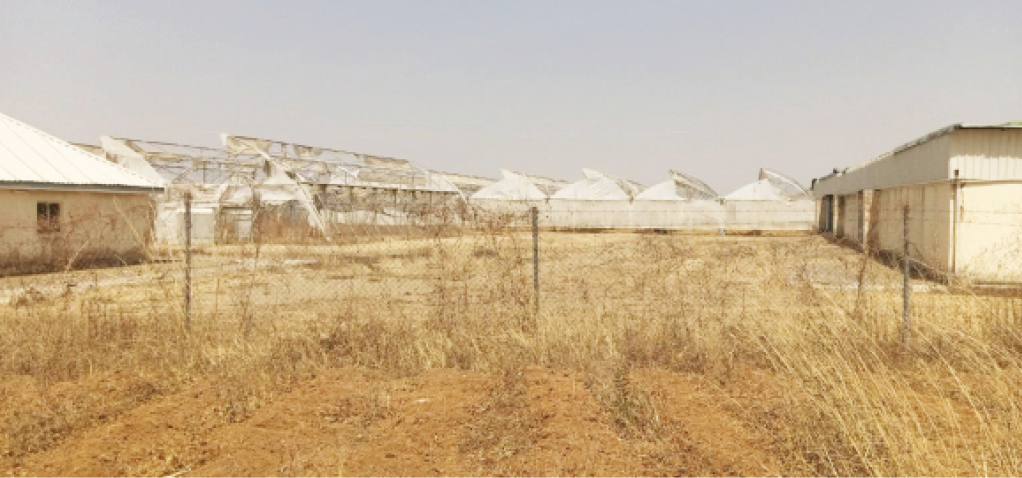Why Plateau’s multibillion naira investments in greenhouse, others collapsed
The Agric Services Training Centre and Marketing Limited (ASTC&LM) was initiated by the Plateau State Government in collaboration with an Israeli company in 2009. The training centre was initiated by former Governor Jonah Jang to provide pure agricultural services in the state. The centre had several investments, both in greenhouse production, dairy and training services. […]

One of the abandoned agro investments in the state
The Agric Services Training Centre and Marketing Limited (ASTC&LM) was initiated by the Plateau State Government in collaboration with an Israeli company in 2009. The training centre was initiated by former Governor Jonah Jang to provide pure agricultural services in the state.
The centre had several investments, both in greenhouse production, dairy and training services.
The programme, which was located in each of the three geopolitical zones of the state, was also aimed at creating self-sustainable agricultural growth and boost the sector through training farmers on modern best practices, rendering tractor services to farmers that can’t afford to purchase and maintain them.
The centres also sell agrochemicals and fertilisers that are tested, provide hybrid seeds, seedlings and give advice on how, when, and the right quantity of inputs to use, as well as render services to clients.
Obaseki remains my friend despite political differences – Oshiomhole
20 UNICAL students hospitalised after exam stampede
Hundreds of farmers across the local governments of the state have benefitted from the programme. Many of them said they achieved a lot through the training they received, adding, however, that the improved seedlings acquired from the centres were no longer available.
However, these opportunities were dashed by certain factors, which, according to them, eventually led to their collapse some years ago.
Multiple sources told our correspondent that insecurity, which has been bedeviling the state for more than 20 years, is one of the two major reasons the management staff of the programme left the state for Ogun and other states of the federation.
The sources added that aside the security challenges, stealing the properties of the company by hoodlums was also a source of concern that contributed to the collapse of the programme.
Hamza Abdullahi, a Jos resident who benefitted from the programme said, “Before the collapse of the centre, I was trained on how to grow different crops. I learned a lot from there. We used to get seedlings and other farm inputs at cheaper rates. But unfortunately, today, the place has collapsed. The issue of insecurity was one of the reasons the staff left for some areas. Some are currently in Ogun State. Added to that, hoodlums used to steal their equipment. I think that looking at these challenges, they decided to leave.”
Azi Peter, another farmer who is not happy with the current situation of the training centres said, “These are areas where you could hire tractors at a very low price. You could get farming inputs at affordable prices too. Improved seedlings were also available and affordable. But now, all these are not possible because the centres are not functioning.
“The development has affected our farming cultivation because we cannot hire tractors or afford other inputs from other places. It is very expensive to afford them. Improved seedlings are not also available. And the situation has affected agricultural outputs in the state.”
All efforts to get the reaction of the state commissioner for agriculture, Bugama Samson on any possible plan to revive the centres were unsuccessful as calls and text messages from our correspondent were not responded to.
But recently, the managing director/chief executive officer of the ASTC, Dr Susan Bentu, told journalists at the official flag-off of the farming intervention at Ligitlubang community that Governor Caleb Mutfwang had directed the intervention to cover communities affected by recent attacks and destruction of farms.
Bentu said the Plateau State Government had commissioned the ASTC to cultivate lands in areas that suffered attacks, resulting in the displacement of numerous farmers.
“Government’s intervention comes as respite for these communities as Governor Mutfwang approved the cultivation of 900 hectares of land across three local government areas – Mangu, Barkin Ladi and Riyom – in the first phase of the intervention,” he said.
